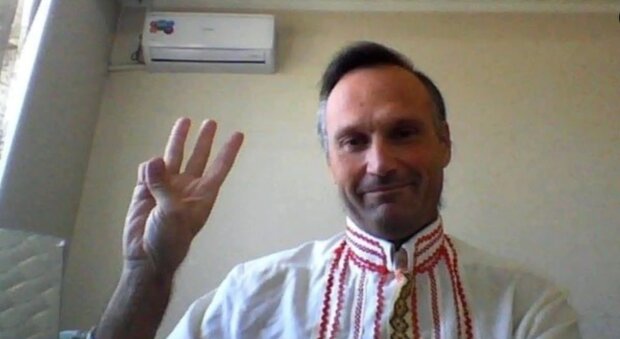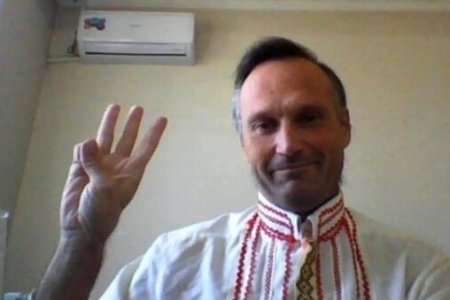
A ‘court’ in occupied Crimea has found Andriy Bielozierov guilty of ‘repeated public actions aimed at discrediting Russia’s armed forces’ through a post on social media about Russia’s bombing and killing of civilians. There was nothing at all untruthful in the post, but nor is this required under the draconian silencing norms rushed into law shortly after Russia’s full-scale invasion of Ukraine.
These were the first criminal charges against the former lecturer after two prosecutions, one under the analogous administrative charge of ‘discrediting the Russian armed forces’, for Ukrainian songs. Bielozierov had been held under house arrest since December 2022 and there seemed grounds for fearing a term of imprisonment of up to five years. Instead, ‘judge’ Kirill Chinov from the occupation ‘Central district court’ in Simferopol imposed a steep 100 thousand rouble fine, and also banned Bielozierov from administering social media sites for two years. News of the sentence was reported by the Russian human rights initiative OVD.Info, whose lawyer represented Bielozierov.
The ‘investigation’ into the charges against Bielozierov was completed at the beginning of February 2023, although what exactly there was to investigate seems unclear as the charge of ‘repeated actions aimed at discrediting the Russian armed forces’ under Article 280.3 § 1 of Russia’s criminal code was reported earlier. So too was the post from October 2022 through which Bielozierov was supposed to have discredited the armed forces. In it, he had written the following: “the Russian Federation’s armed forces bombed innocent Ukrainian children and woman in Donbas for 8 years, turning cannons from the frontline in the direction of Donetsk, and over the past half a year the RF armed forces are again bombing Ukrainian citizens and killing Ukrainian residents.”
Russia has been using both the administrative and criminal norm on supposed ‘public actions aimed at discrediting the armed forces’ as a weapon against those who express opposition to Russia’s full-scale invasion of Ukraine or who tell the truth about the crimes being committed, especially through attacks against the civilian population. In fact, Bielozierov could, just as easily, have been charged under the more serious Article 207.3 of Russia’s criminal code. This purportedly only punishes for “knowingly circulating false information”, but has already been used to imprison people like Russian journalist Maria Ponomarenko for entirely truthful comments about Russia’s deliberate bombing of the Mariupol Drama Theatre and killing of the hundreds of civilians who were seeking shelter there.
45-year-old Bielozierov was dismissed from the Bilohirsk Technical College in September 2022, after a video was posted on the Internet in which he could be seen with his laptop open, playing the Ukrainian song about the uses of the Bayraktar drone against the Russian invaders. There were a few students around, and he later explained to Kholod that he had always answered any questions from his students about the events unfolding. He said that on this occasion, some students had come up to him during a break and asked how a drone works. The Crimean Human Rights Group reports that it was Bielozierov’s students who denounced him, claiming that he had told them he was looking forward to the arrival of the Ukrainian Armed Forces, and that in social media he had been negative about the Russians, had been pleased at their losses and had suggested that the Crimean Bridge (illegally built by the invaders) would be hit.
Over the ‘Bayraktar’ video, Bielozierov was also prosecuted for ‘public actions aimed at discrediting the use of the Russian armed forces’ (Article 20.3.3 of the Code of administrative offences) and fined.
In October, he was prosecuted under the administrative Article 20.3 for what was claimed to be ‘propaganda or public demonstration of Nazi symbols, or symbols / other elements of extremist organizations or other symbols, etc.’ over his posting on social media of the Ukrainian patriotic song ‘Chervona Kalyna’ [‘Red Kalyna, or Vibernum’]. The excuse for the prosecution is the claim that slogans from the song were used by the Organization of Ukrainian Nationalists, which Russia has banned. This is doubtless a pretext, with the real reason being the international prominence and poignance the song has gained since Russia’s full-scale invasion of Ukraine. The version first sung alone by Andriy Klyvniuk from Boombox, then accompanied by others in a powerful Zoom performance later became known worldwide through a Pink Floyd version with all proceeds going to the Ukrainian Humanitarian Fund.
Bielozierov later reported that the FSB had turned up at his hostel on 28 October 2022, forced him to the ground and had kicked him around the kidneys, the stomach and chest. They had also trodden on his head, causing damage to his earlobes and one had hit him in the face. They had removed all of his documents, including his Ukrainian passport and work record booklet, as well as his laptop and telephone.
On that same day, ‘judge’ Aleksandr Vladimirovich Voronoi from the occupation ‘Central district court’ jailed him for 14 days.
The criminal charge was laid on 23 December 2023 with Bielozierov under house arrest since then.



